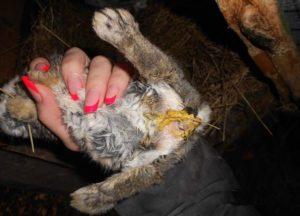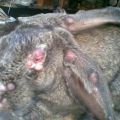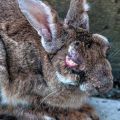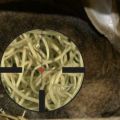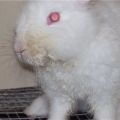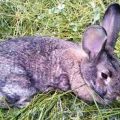Causes and symptoms of rhinitis in rabbits, treatment of the common cold and prevention
Domestic rabbits, like any pets, tend to get sick. If the rules for keeping these fluffy animals are not followed, a variety of pathological conditions are observed. Many of them are accompanied by a runny nose. A seemingly harmless symptom can cause serious consequences. If rhinitis began in rabbits, then you should not delay treatment.
Rhinitis causes in rabbits
Even the most experienced and responsible rabbit owners can tolerate rhinitis in their pets. Before choosing a treatment, you need to know that the causes of a cold can be:
- drafts and temperature drops;
- feed;
- infection;
- injury to the nasal mucosa.
A poor diet causes a decrease in immunity and causes a runny nose. Each form of rhinitis can have similar symptoms, but requires specific treatment.
The main symptoms
The first signs of rhinitis may be subtle and seem harmless enough. At the onset of the disease, the animal can notice a damp fur near the nose. As it develops, the following symptoms appear:
- redness of the eyes and enlargement of the nose;
- white snot at the onset of the disease;
- discharge from the nose becomes viscous, changes color to green;
- the animal is worried and combs its nose until it bleeds;
- dried crusts appear near the nose and on the cheeks.
As the disease progresses, it becomes difficult for the pet to breathe, wheezing is heard. The animal refuses food and becomes very thin.
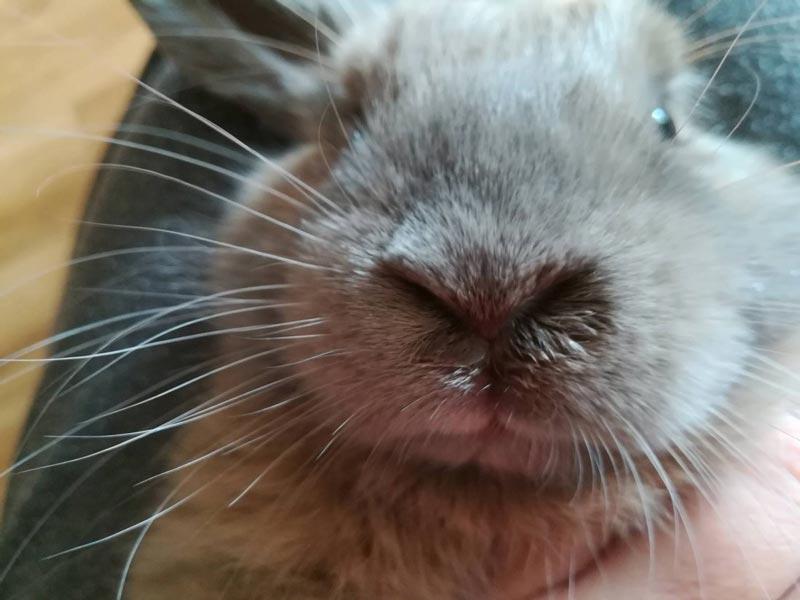
Stages and types of the disease
Rabbits suffer from the following types of rhinitis:
- Allergic - the reasons can be food, dust, dust, the presence of allergenic plants.
- Cold - it arises from drafts, excessive humidity, low temperatures;
- Infectious - a very dangerous form of rhinitis that all rabbits can get infected with. It is caused by conditionally pathogenic microorganisms staphylococcus, streptococcus, pasteurella, Escherichia coli.
- Traumatic - appears as a result of fights or accidental damage to the nasal mucosa.
The most dangerous is infectious rhinitis. Its first stage goes unnoticed. The incubation period lasts up to 5-7 days. As a rule, a runny nose is not acute. If you do not take measures for treatment, then it flows into the chronic stage. In some cases, rhinitis is complicated by bronchitis, pneumonia, blood poisoning and leads to the death of the rabbit.
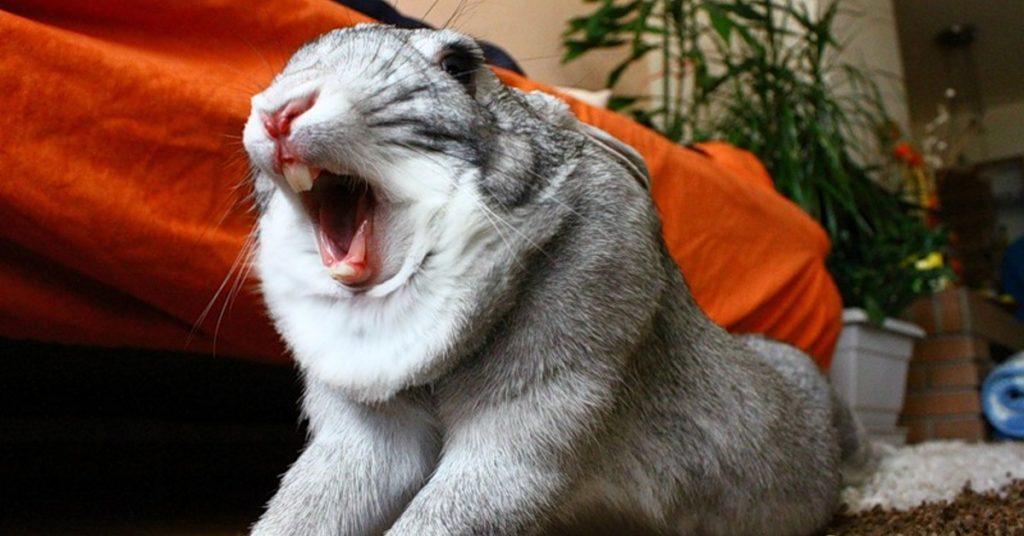
Diagnosis of the disease
An accurate diagnosis is made based on the history after examining the animal. It is confirmed by the results of laboratory studies of nasal mucus.This allows you to identify the pathogen and exclude the common cold of non-infectious origin.
Correct diagnosis will help you choose a treatment regimen for a rabbit for a cold.
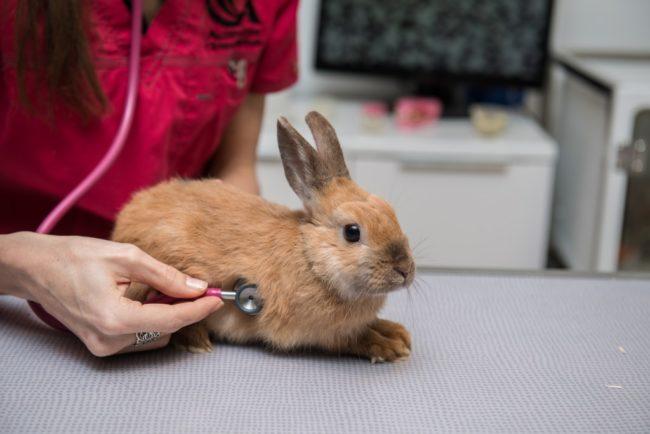
Rules for the treatment of rhinitis in rabbits
Treatment for rhinitis is based on the diagnosis. Allergic rhinitis resolves when the allergen is removed. It is enough to pick up the food, change the bedding for it to pass. If the cause of the runny nose is trauma, then the use of funds to accelerate healing will be required. The most difficult treatment is for colds and infectious rhinitis.
Drug treatment
If a rabbit's runny nose is of a cold nature, then drug treatment can be limited by rinsing the nose with a furacilin solution. It is enough to crush two tablets and dissolve them in 100 ml of warm water. Treatment continues for 14-20 days, carrying out the procedure for instilling or rinsing the nose 3-4 times a day.
When treating an infectious rhinitis, you will need to use:
- antibiotics for injections, Nitox Forte is suitable;
- antibiotics for washing the nose, "Penicillin", "Azithromycin";
- immunostimulants, for example, "Aminosola", "Fosprinil", "Ribotana".

In some cases, recovery can be accelerated by the use of homeopathic remedies.
Homeopathy
Rhinitis can be treated with remedies that are used in scanty, homeopathic quantities. To do this, you can add lactic acid to the drinkers at the rate of 1 ml per liter of water.
In homeopathic doses, you can give rabbits the drug "Brovafom new". One gram of the substance is added to a liter of drinking water.
Homeopathic treatment can include drinking sage and mint decoction to animals, with the addition of a drop of tea tree oil. The same solution can be used to wipe the muzzles of the animals contaminated with noses. For the treatment of a common cold in rabbits, you can give an infusion of chamomile or calendula.

Inhalation
For the treatment of a decorative rabbit, inhalation is used. To do this, prepare a decoction of eucalyptus leaves, pour the hot liquid into a convenient and stable container, and put it in a cage to the animal. Cover with a towel on top. The procedure lasts 10-15 minutes and is carried out three times a day. The course of treatment is 7-10 days.
Diet
A varied diet is made up for sick animals. The following herbs are added to it:
- pharmacy chamomile;
- green onions;
- dill;
- mint.
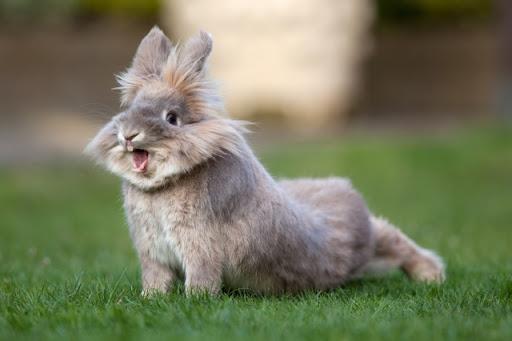
Fresh greens are dried before feeding. If animals are fed with hay, then the diet should also contain juicy roots, vegetables, and fruits. In the shelves, instead of water, you can add herbal decoctions. To strengthen the immune system, pets can be given special vitamin supplements "Chiktonik", "Prodevit".
The main methods of prevention
Prevention consists in observing the conditions of keeping, feeding and caring for rabbits. The room where the cages are located should be clean, dry and well ventilated. There should be no drafts in it, the desired humidity is 50-70%.
At least once a week, you need to inspect the faces and paws of animals. If the wool near the nose is wet, and on the paws it is stuck together, then it is better to isolate the rabbit. When the listed signs of a runny nose appear, all suspicious individuals are deposited, and the cells are disinfected. The new animal is kept separately from the rest for 14 days.
